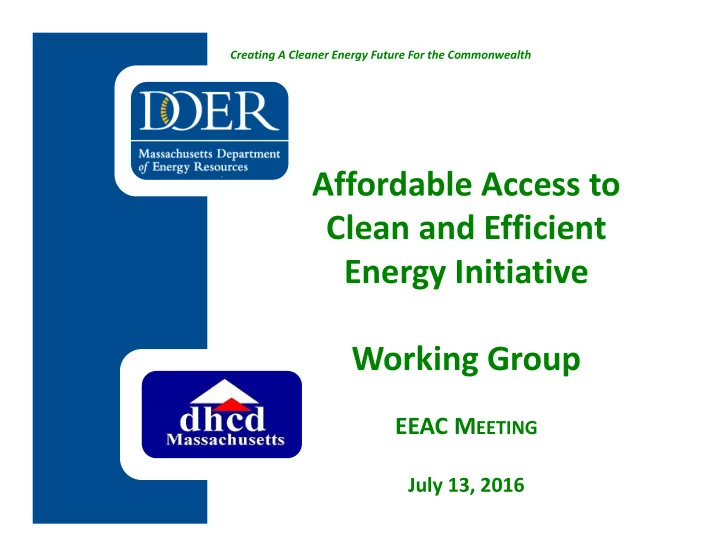

Creating A Cleaner Energy Future For the Commonwealth Affordable Access to Clean and Efficient Energy Initiative Working Group EEAC M EETING July 13, 2016
Affordable Access to Clean and Efficient Energy Initiative • Baker ‐ Polito Administration Initiative lead by Department of Energy Resources (DOER) and Department of Housing and Community Development (DHCD) Announced in February 2016 by Governor Baker at the Winn Boott Mills Development in Lowell, MA • Key Components: $15 million in committed funding from DOER and MassCEC for new and existing programs that incentivize renewable energy for low income residents Increase renewable energy coordination with existing statewide energy efficiency program Create an Inter ‐ secretariat Working Group 2
Affordable Access to Clean and Efficient Energy Initiative • Overarching Goals: • Increase energy affordability • Build on Massachusetts’ established, nation ‐ leading energy efficiency programs • Increase equitable access to clean energy for all Massachusetts residents regardless of income • DOER and DHCD hope to achieve these goals by: Coordinating new and existing low ‐ income programs under a common directive to increase program and policy coordination Developing innovative solutions to low ‐ income energy challenges requiring multiple agency coordination Convene an inter ‐ Secretariat Working Group of energy and housing agencies to identify and advance coordinated strategies 3
DOER and MassCEC $15 Million Commitment Funding is for renewable energy programs that coordinate with the existing energy efficiency program and provide energy burden reductions for low and moderate income residents • DOER: Renewable Thermal for Homes on Fuel Assistance Program: DOER has expanded this existing renewable thermal program that provides funding to community action agencies for renewable secondary heating installations for LIHEAP recipients • MassCEC Clean Energy for Low Income Program: $2 million in grant funding to multiple awardees that will demonstrate energy savings to low income buildings Clean Heating and Cooling Program: Increased low income rebate adders for the clean heating and cooling rebate program • Additional funding will be released with the release of the Affordable Access Working Group Final Report and as program design is completed 4
Working Group Working Group Structure: Hosted by DHCD and DOER • Governor’s Office Steering Committee assisted by Meister • Key Stakeholders Consulting Group to facilitate discussion, EEA collect feedback, and organize and DOER Housing and Energy develop recommendations MassCEC Non ‐ Profits and Developers Steering Committee includes • representatives from DOER Renewables, Housing and Economic Development DOER Energy Efficiency, DHCD Public DHCD Housing, DHCD Subsidized Housing, and MassHousing MassCEC MassDevelopment Mass Housing Partnership Meetings began March 31 st • • Three meetings so far have developed multiple recommendations • Two meetings (Aug 3, Aug 30) remain to prioritize and finalize recommendations • A final report is expected this Fall 5
Working Group Public and Quasi ‐ Public Agencies Private Stakeholders • Department of Energy Resources • Boston Community Capital • Department of Housing and Community • Center for Sustainable Energy • Co ‐ op Power Development • Massachusetts Clean Energy Center • Eversource – Energy Efficiency • MassDevelopment • Habitat for Humanity – Cape Cod • Mass Housing Partnership • Homeowner's Rehab, Inc • MassHousing • Local Initiatives Support Corporation • Community Economic Development • Low Income Energy Assistance Network Assistance Corporation (CEDAC) (LEAN) • Metropolitan Area Planning Council • National Grid – Energy Efficiency • New Ecology • Preservation of Affordable Housing • WinnCompanies • Worcester Green Low Income Housing Coalition 6
Initiative Scope Scope of Working Group • Low and Moderate Income Residents • Subsidized, Public, and Naturally Occurring Affordable Housing • Renewable Energy and Energy Efficiency • DOER and DHCD Programs and Policies Newsletter • As part of the Initiative outreach, the Affordable Access Steering Committee releases a monthly Newsletter with a survey soliciting stakeholder responses • The Newsletter provides broader stakeholder feedback beyond the Working Group • Survey responses have included different perspectives including personal experiences as low or moderate income residents to existing programs 7
Recommendations High Level Recommendation 1: Agency Coordination • • Share expertise, share data , time and coordinate complementary policies and programs • High Level Recommendation 2: Create Demand • Increase awareness of program existence and possible cost savings , increase voluntary demand, and increase demand through mandate or requirement • High Level Recommendation 3: Financing and Incentives • Increase access to traditional financing, program design with low and moderate income community consideration, most cost effective use of funding for low income communities, consider long term energy burden reductions 8
Recommend
More recommend